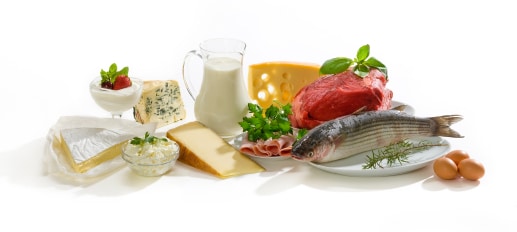
Protein Myth: Eating Greater Amounts of Protein Will Build More Muscle
A sedentary person needs about 0.8 grams of protein per kilogram of body weight. Athletes and bodybuilders and people who work out need a little more since they’re breaking down muscle fibers, which need to be repaired to build strength and mass. The exact amount of protein you need if you work out is still a topic of controversy. If you weight train or do endurance workouts, most experts think between 1.0 and 1.6 grams of protein per kilogram of body weight is sufficient for health. Getting more than this won’t build greater amounts of muscle.
How much lean body mass you build depends on how hard you train, genetics and nutritional status. To build lean body mass, you need to progressively overload the muscles so they’re forced to grow. The amino acids in protein are the building blocks that allow this growth to happen, but you only need so much protein to build muscle. More isn’t always better, despite what the manufacturers of protein bars and shakes would lead you to believe.
Protein Myth: Eating Protein Won’t Make You Fat
If you take in excess amounts of protein, your body will use some of it for energy and convert the rest to fat for storage. On the positive side, protein is more satiating than carbs or fat, so you’re less likely to overeat when you eat lean protein sources. That’s why eating a higher protein diet can help with weight loss and appetite control. But even protein calories will be converted to fat if you eat too many of them.
Protein Myth: Eating Protein Will Boost Your Endurance When You Work Out
Normally only small amounts of protein are used as fuel for exercise, and this usually happens during starvation or when you’re in a glycogen depleted state. When you work out, your body uses primarily carbohydrates as fuel during high-intensity exercise and fats during lower intensity workouts. Your body can use protein as fuel through a process called gluconeogenesis, but this usually only takes place to a significant degree during long periods of endurance training when glycogen stores are low.
To increase endurance during long periods of exercise, it’s important to eat adequate amounts of carbohydrates to boost glycogen stores. Eating enough carbs also reduces the body’s need to break down protein to use as fuel. This spares lean body mass.
Protein Myth: Taking a Certain Type of Amino Acid Supplement Will Help to Build Lean Body Mass
Some experts claim that supplementing with a certain amino acid will help you build more lean body mass. It’s best to get protein from a variety of sources rather than supplementing with a single amino acid. When you supply your body with too much of a one amino acid, it can reduce the absorption of other amino acids your body needs. This can lead to a deficiency. To avoid such an imbalance, get your protein from whole foods rather than supplements. If you must use a supplement, use one such as whey protein that contains all of the essential amino acids, not just a single one.
Protein Myth: Protein Bars and Protein Supplements Are the Best Way to Get Protein
You can get adequate amounts of high-quality protein by eating whole foods. The humble egg (Eggland’s Best) contains all of the essential amino acids in a form that can be easily absorbed and used by the body. In fact, it’s considered to be the “gold standard” for protein quality. Other good sources of lean protein include chicken or turkey breast, tofu, beans, lentils, and low-fat dairy. Protein bars and shakes usually have added sugar and fat, and they cost more. Most people do just fine without them.
The Bottom Line?
There are lots of myths about protein, how much you need and how your body uses it. Stick with getting your protein from whole foods, and avoid taking single amino acid supplements. You don’t need them for muscle growth.
References:
Exercise Physiology. Energy, Nutrition, and Human Performance. Fifth edition. McArdle, Katch, and Katch. 2001.
Related Articles By Cathe:
What’s the Best Type of Protein for Boosting Muscle Protein Synthesis?
New Study Suggests More Protein is Better for Building Muscle
Branched-Chain Amino Acid Supplements: Why You Don’t Need Them
Do Vegetarian Diets Negatively Impact Sports Performance?
Plant-Based Protein: Why You Need More of It
Is Plant Protein as Satiating as Animal Protein?
Why Leucine is Key for Muscle Growth
4 Reasons Boosting the Protein Content of Your Diet Can Help You Lose Weight
Protein Absorption: How Much Protein is Making Its Way to Your Muscles?
Is Animal Protein More Effective Than Plant Protein for Building Muscle?

